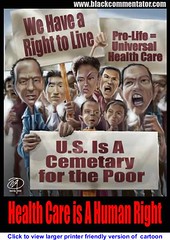DC health and wellness care planning: take two
Update: Marc Fisher of the Post weighs in on this topic in today's column, "Free-Standing ER: Alternative Medicine for D.C.'s Hospital Headache," where he writes:
Sadly, the debate has completely lost sight of the reasons D.C. General was shuttered in 2001. The District indeed suffers from an unacceptable health crisis, but the last thing the city needs is another money-losing behemoth of a hospital. Rather, the city's problems are grounded in the fact that many thousands of people have no primary care doctor and no one paying regular attention to their chronic ailments.
The result: The city's emergency rooms become de facto walk-in clinics. Check out the appalling scene at Washington Hospital Center or at any of the city's big ERs, and you'll find people who've been waiting for 10, 20, 30 hours, boarding on stretchers parked in the open hallways while they wait for treatment.
There is an alternative, and it's both vastly more affordable and far better for patients...
Well, I disagree that the debate has lost sight of the reasons that DC General was shuttered. People like Dr. Eric Rosenthal in his postings in DC Watch, and I think an op-ed in the Post, myself in the blog, and many others have been making these very same points since last summer.
We want a great health and wellness care system. We want to better address the chronic health care problems that are too often widespread within our community. We think that building a hospital doesn't address those needs. While we are saying we don't need to build another hospital, we are saying address these chronic health and wellness issues in the best possible manner.
It's not that people of color don't have a reason to be concerned, and a history and memory of past offenses that justifies being skeptical today:
-- Unequal Treatment: Confronting Racial and Ethnic Disparities in Health Care (Johns Hopkins University Institute of Medicine) detailed study into the disparities in the quality of healthcare provided to people of color;
-- Report on Racial and Ethnic Disparities in Health Care (American Medical Association) includes details of the AMA's recently adopted "zero tolerance" policy toward racial disparities in healthcare.
But adding more of the same, hospital-care, rather than health- and wellness-care, won't change things very much.
 Image from one of my favorite e-publications, Black Commentator.
Image from one of my favorite e-publications, Black Commentator.Index Keywords: health-care-planning



0 Comments:
Post a Comment
<< Home